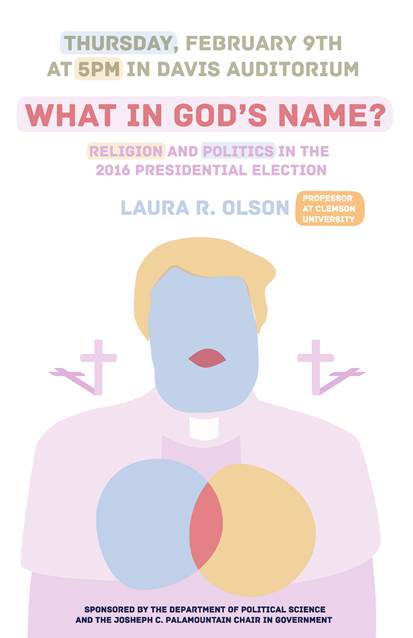"What in God's name" happened in 2016?
 To shed light on the 2016 election—incontestably one of the most surprising and significant
events of recent political history—Clemson University political science professor
Laura Olson joined a Skidmore audience to discuss some key factors in the outcome
of the race. In her lecture, titled “What in God’s Name? Religion and Politics in
the 2016 Presidential Election,” Olson presented statistics, photographs, and political
cartoons to illustrate three main points.
To shed light on the 2016 election—incontestably one of the most surprising and significant
events of recent political history—Clemson University political science professor
Laura Olson joined a Skidmore audience to discuss some key factors in the outcome
of the race. In her lecture, titled “What in God’s Name? Religion and Politics in
the 2016 Presidential Election,” Olson presented statistics, photographs, and political
cartoons to illustrate three main points.
First she showed that party identity for both Republicans and Democrats is highly related to religious affiliation and degree of religiosity. In recent years, white Protestants and Catholics have been growing more and more likely to identify as Republicans, while voters unaffiliated with any organized religion are more likely to be Democrats. And highly religious people (those who attended worship services often) were more likely to vote for Trump, while people who were not religious at all were much more likely Clinton voters.
Olson’s second point highlighted community interaction. Liberal people tend to seek diversity and are therefore more likely to take up residence in cities, while in general conservatives prefer communities that share their own religious values so they more often live in suburban and rural areas.
Finally, Olson discussed how campaigns use their candidates’ characteristics to target religious voters—the abortion issue being key in many recent elections. Olson drew a parallel between Trump’s appeal to nostalgia in “Make America Great Again” and his stance toward reproductive rights. She presented an official letter from the Trump campaign declaring its explicit intention to nominate a pro-life Supreme Court justice as one example of how Trump took advantage of his established relationship with nostalgia in order to harken back to a time before the Supreme Court’s 1973 legalization of abortion.
After her talk, Olson eagerly answered questions from the audience. One student, for example, asked why Democrats generally don’t attempt to appeal to religious voters, and Olson pointed out that Republicans had already targeted and almost exclusively claimed the religious voting blocs, and she posited that if Democrats tried such an appeal they would risk alienating their religiously unaffiliated voters.
While Olson quipped that “the first rule of social science is ‘It depends,’” she delivered a well-grounded and factual case that left her audience with a fuller understanding of how faith and politics in the U.S. are inextricably linked—and will continue to be during the Trump presidency and afterward.


